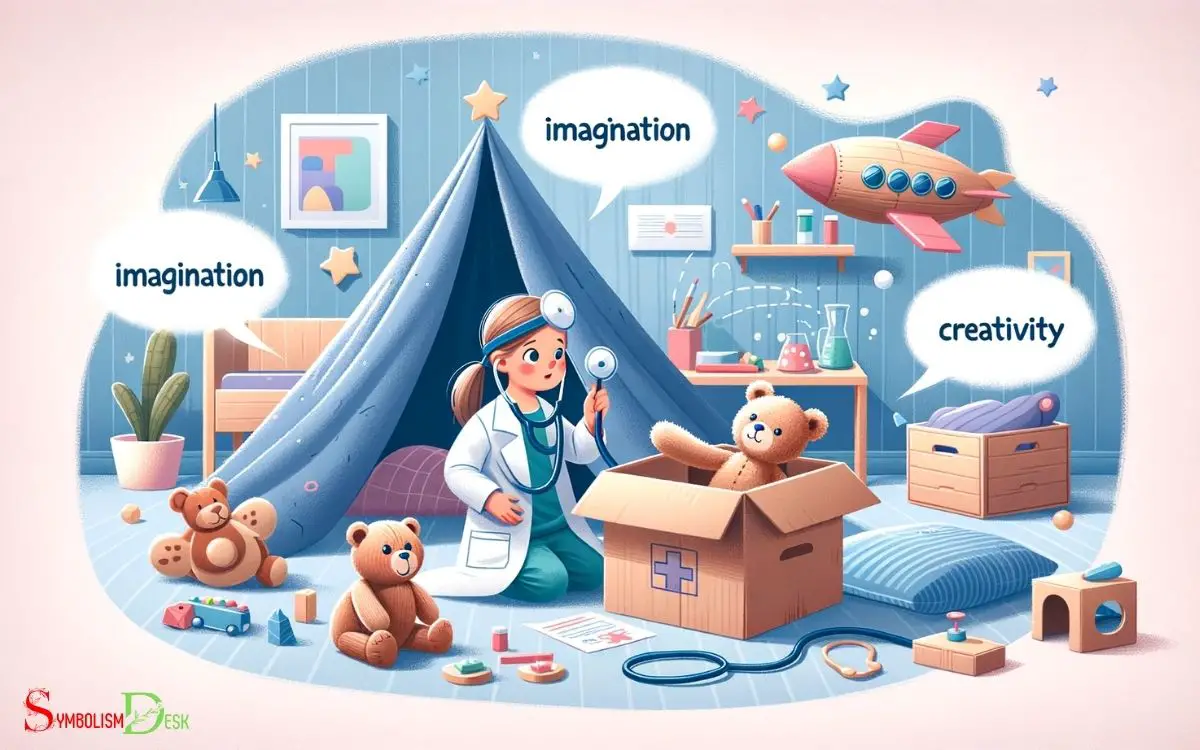What Does Symbolic Play Mean? Ideas!
Symbolic play, often referred to as pretend play, is an essential developmental stage where children use objects, actions, or ideas to represent other objects, actions, or ideas as play. It is a critical aspect of childhood development that supports cognitive, social, and emotional growth.
Symbolic play typically emerges around the age of 18 months and continues to become more complex throughout early childhood.
It plays a crucial role in:
- Cognitive Development: Enhances problem-solving abilities, fosters creativity, and aids in language development.
- Social Skills: Encourages cooperation, teaches role-taking, and helps in understanding social norms.
- Emotional Growth: Provides a safe space for expressing feelings and working through emotions.
For instance, a child using a banana as a telephone is engaging in symbolic play, demonstrating their understanding that one thing can represent another.
Engaging in symbolic play can be as simple as a child pretending a stick is a magic wand, unlocking a realm of creativity and learning.

Key Takeaway
Understanding the Concept of Symbolic Play
| Symbolic Play Aspect | Definition |
|---|---|
| Concept | Symbolic play, also known as “pretend play” or “imaginative play,” refers to the act of children using objects, actions, or ideas to represent other objects, actions, or ideas. It’s a crucial aspect of a child’s cognitive development and helps them practice problem-solving and language skills. |
| Age Range | Typically emerges around 18-24 months but can continue to develop and become more complex into the preschool years (around 4-5 years old). |
| Cognitive Skills Involved | – Abstract thinking: ability to use objects, actions, or ideas to represent other objects, actions, or ideas – Language development: expands vocabulary and communication skills – Problem-solving: helps children think creatively and come up with solutions to challenges |
| Social Skills Involved | – Empathy: understanding and expressing emotions appropriately – Cooperation: working with others in a group setting – Role-playing: taking on different roles and perspectives |
| Examples of Symbolic Play | – A child using a block as a “phone” – A child pretending to be a doctor and “curing” their stuffed animals – A child using a toy car to represent their parent’s car and driving it around the room |
| Benefits | – Enhances creativity and imagination – Develops social skills and empathy – Assists in understanding the world around them – Fosters problem-solving abilities and critical thinking – Promotes language and communication development |
Importance of Symbolic Play in Development
Symbolic play plays a crucial role in a child’s cognitive, emotional, and social development. Through symbolic play, children learn to represent objects and actions with their imagination, laying the foundation for abstract thinking and problem-solving skills.
This type of play allows children to explore different roles, emotions, and scenarios, which contributes to their emotional development and empathy.
Additionally, symbolic play enables children to practice social interactions, negotiation, and cooperation as they engage in make-believe scenarios with peers.
Research has shown that children who engage in rich symbolic play demonstrate advanced language and literacy skills, as well as enhanced creativity and imagination.
Therefore, symbolic play is not just an enjoyable pastime for children, but a fundamental component of their overall development.
Types of Symbolic Play
A child’s engagement in symbolic play can take various forms, each contributing uniquely to their cognitive and social development.
Firstly, functional play involves repetitive actions with objects, such as pushing a toy car. This type of play helps children understand cause and effect, spatial relationships, and object permanence.
Next, constructive play involves using objects to build something, fostering creativity, problem-solving, and fine motor skills.
Then, dramatic play, also known as pretend play, allows children to take on roles and act out scenarios, promoting social skills, empathy, and language development.
Lastly, symbolic play involves using objects to represent something else, supporting abstract thinking and imagination.
Understanding these types of symbolic play provides insight into the diverse ways in which children learn, grow, and make sense of the world around them.
Cognitive Benefits of Symbolic Play
Engaging in symbolic play has been shown to enhance children’s cognitive development through its encouragement of abstract thinking and imagination.
This type of play allows children to create pretend scenarios, take on different roles, and use objects in unconventional ways, all of which contribute to cognitive growth.
The table below outlines the cognitive benefits of symbolic play:
| Cognitive Benefits | Description |
|---|---|
| Enhanced Problem Solving | Symbolic play requires children to think creatively and come up with solutions to imaginary or real-life problems. |
| Improved Language Skills | Children engage in verbal communication, expanding their vocabulary and language abilities. |
| Enhanced Memory Skills | Remembering roles, scenarios, and rules within the play boosts children’s memory and recall capabilities. |
| Increased Attention Span | Engaging in prolonged imaginative play helps children develop longer attention spans and focus abilities. |
Social and Emotional Aspects of Symbolic Play
When considering symbolic play, it is important to delve into its social and emotional aspects, which significantly impact children’s development.
This type of play has a profound influence on children’s social and emotional development, fostering essential skills and behaviors.
Here are three key aspects of the social and emotional impact of symbolic play:
- Empathy and Understanding: Symbolic play allows children to take on different roles, encouraging them to understand different perspectives and develop empathy towards others.
- Communication and Collaboration: Engaging in symbolic play often involves negotiation, cooperation, and communication with peers, fostering essential social skills and the ability to work collaboratively.
- Emotional Regulation: Through symbolic play, children can explore and express a range of emotions in a safe and controlled environment, helping them learn to regulate their emotions effectively.
These social and emotional aspects of symbolic play are pivotal in shaping a child’s development, laying the groundwork for healthy social interactions and emotional intelligence.
Transitioning into the subsequent section about ‘encouraging symbolic play in children’, it is essential to consider how caregivers and educators can support and promote this valuable form of play.
What are Some Ideas for Symbolic Play?
Children can engage in symbolic play using everyday objects like dolls, toy cars, or dress-up clothes. They may create scenarios and act them out, exploring the symbolic meaning of 40. Encouraging imaginative play helps develop cognitive, social, and emotional skills in children.
Encouraging Symbolic Play in Children
To encourage symbolic play in children, caregivers and educators can provide diverse props and materials for open-ended exploration. This allows children to use their imagination and creativity, essential for developing symbolic play skills.
Below are examples of props and materials that can be provided to encourage symbolic play:
| Props | Materials |
|---|---|
| Dress-up clothes | Playdough |
| Toy food and dishes | Blocks |
| Dolls and action figures | Art supplies |
| Toy tools | Natural materials (e.g., sticks, rocks) |
These props and materials support various forms of symbolic play, such as role-playing, object substitution, and creating imaginary worlds.
Additionally, adults can participate in the play, offering guidance and expanding the play scenarios, further enhancing children’s symbolic play skills.
By providing these resources and engaging with children during play, caregivers and educators can foster the development of rich and imaginative symbolic play.
Conclusion
Symbolic play is essential for child development, offering cognitive, social, and emotional benefits.
Encouraging this type of play in children can support their overall growth and learning.
Understanding the importance and types of symbolic play can help caregivers and educators create environments that promote and enhance children’s symbolic play experiences.







